Tips and tricks for unfortunate hikes / Sfaturi și trucuri pentru drumeții nenorocoase
[EN] The summer is coming to an end. But that doesn’t mean we will stop hiking in the mountains. There are so many good ways in the Carpathians mountains. Let’s have some fresh air and enjoy the view. The color of autumn…
But wait, where are my friends? Where is the path?
Tip n°1: Calm
Stay calm and put for the time being. Don’t try to run to your friends. Take a time to think and answer a few questions. Where are you? Where do your friends and the path is? Do you have any means of communications?
Tip n°2: Observe
If you didn’t really look at the map, or plan your walk, look at what is around you. Any traces of civilization that might help you? Signs or far away people? Any traces of the paths? What are the main features? Peaks? Special rock formation? Special tree?
Where did you walk before being there?
Tip n°3: Communication
A good thing is that in Romania even in the mountains you often have a good signal. But you have to have a charged phone. Yep don’t listen to Streaming music all the way. Talking about experience…
So if you have your phone charged and signal you can of course you can try to reach one of your friends that have some idea of the way. You can have some help by describing what you have observed. If your friend is not reachable, you can try the number of the “cabanas” / refuges around if you have them, or the local tourism office. Or some people that know the place. As a last resort you can even call the 112 to make them help you.
The basic information to give is always: where, what, who, and some idea of how to get there, in that order. So if your battery is failing at least they’ll have the most important pieces of information first.
Starting to find your way yourself
Of course if you know the path or a good person to explain you the way, it should be easier to just try to find your way back. But that’s not always the case.
A first thing to do would be to have some sense of orientation. What is your objective? If you have some idea of the map and you remember that you came roughly by the south east, well let’s look for that.
So how to find the north?
I guess you’re not really the super scout so you don’t have a compass. And assuming you don’t have signal, you don’t have data to download some compass “app” (yep an app for everything I guess… )
We all heard the stories about the moss on the tree. The truth is, yes the moss grows more on the side facing the North on the trees because it’s less exposed to the sun. Buuut for that you would need, you guessed it, trees. And a not too wet area where they have moss everywhere…
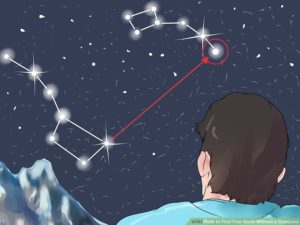
Second known trick: find Polaris, the polar star. As shown below, the trick is to use the two stars from the back of the big Dipper and continue them to find the last star of the small Dipper. That is Polaris, and that shows you where the north is. If you put yourself in the front of it, you have west on your left, east on your right, and behind you is the south. The problem with this… yes it’s only doable in the night and you don’t really walk in the night, even with some lights with you. And I wouldn’t advise you to, because the distances are really not the same in the eye, and the terrain might have rocks or holes you don’t see well.
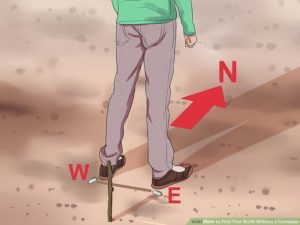 Third trick, maybe the most useful. Find a stick or use a pen, a fork or anything that can cast a shadow. Mark the top of the shadow. Wait 10-15 minutes. Mark the new top of the shadow. The sun had moved from East to West. The shadow shows the opposite (West to East). So if you put your left foot on the first mark, and your right foot on the second mark, you’ll face the north. Only problem… when there is no sun.
Third trick, maybe the most useful. Find a stick or use a pen, a fork or anything that can cast a shadow. Mark the top of the shadow. Wait 10-15 minutes. Mark the new top of the shadow. The sun had moved from East to West. The shadow shows the opposite (West to East). So if you put your left foot on the first mark, and your right foot on the second mark, you’ll face the north. Only problem… when there is no sun.
There is a lot of more tricky tricks like a trick with the markers on a watch if you can only guess where the sun is. If you’re interested go to https://www.wikihow.com/Find-True-North-Without-a-Compass)
If you get stuck somewhere
You get stuck somewhere in the beautiful Carpathians mountains because of the weather or because you’re lost or any other reason there is a few things useful to do.
Tip n°3 bis : Communication again
If you can’t reach anyone and you feel you will have to stay there for a long, try to write “help” or “SOS” at any visible place, being from the sky or from the traces of tracks, or any important features. You might sign it to with your name. But don’t alarm people too much if it’s only a little setback.
Tip n°4: Inventory / Observing again
If you’re stuck you’d need to check what resources you have. First, do you have drinkable water? What food stock do you have? Do you have a shelter? Do you have fire?
For water you’d need to find a fresh water point and boil it… if you can.
For food, some knowledge on the eatable plants, berries and mushrooms always helps… but if you don’t know pretty please don’t poison yourself.
For shelter you’d need some skills of sewing a bit some branches together. Find a suitable area (not too wet, too windy, some trees around to help you build it. It’s the kind of things you only really learn by practicing so don’t expect miracles, just a small temporary spot to cover you from the wind and the rain might come handy.
Having a lighter is also very useful in those situations. A small fire can help you boil water to make it drinkable and warm you up to sleep. There is again a lot of little ways of lighting a spark on dry wood. Some glasses or a block of ice used as a lens to concentrate the sun for example. But most of them require some ropes of a knive… Those things that, again, you might have not taken.
So if you’re interested in making fire, poke around the web, you’ll have some ideas 🙂
Conclusion
In nature, a knife or a multiuse knife can go a long way. Some water and lighter can also be useful in a lot of cases, not only the extreme ones. Good shoes and a good backpack can keep you from random pains. Knowing a bit the area is also a plus.
In one word, please, prepare your trip 😉
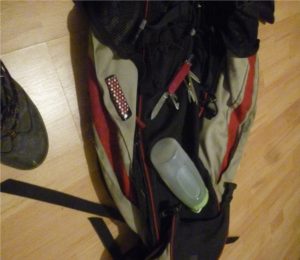
Oh and please, this is useful advices but in reality, if you’re a bit prepared, you won’t have to worry too much.
So enjoy some wonderful views !
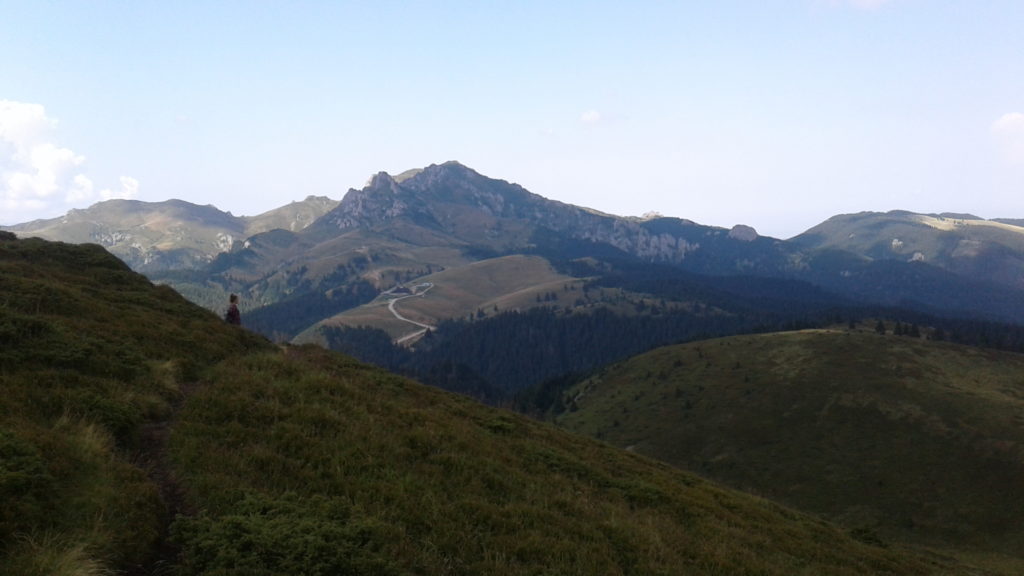
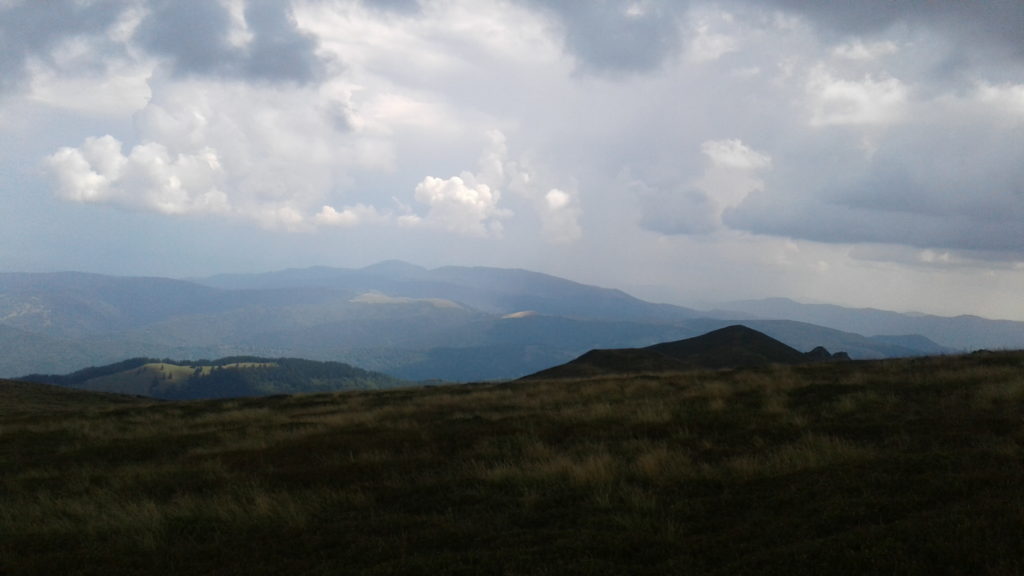
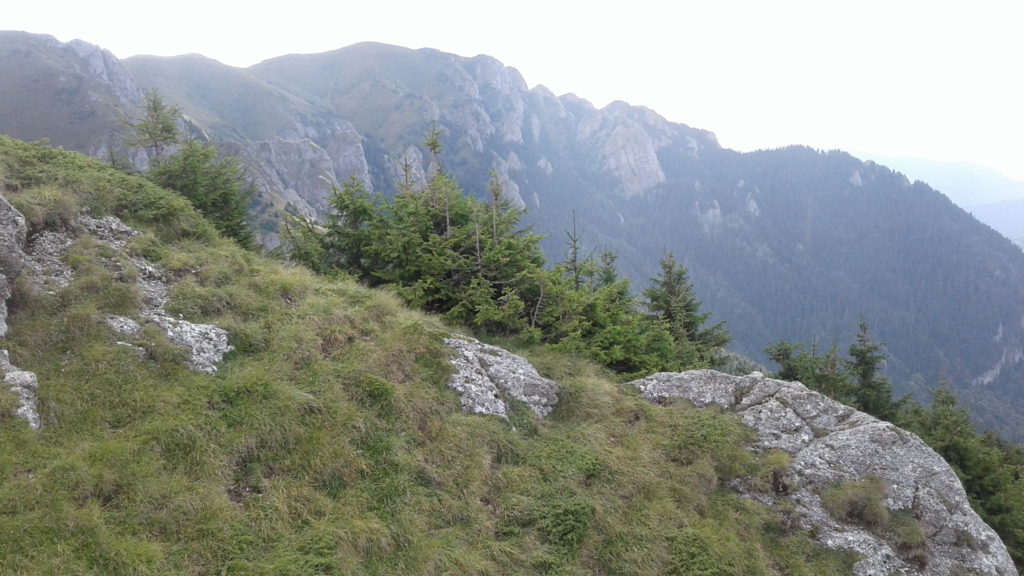
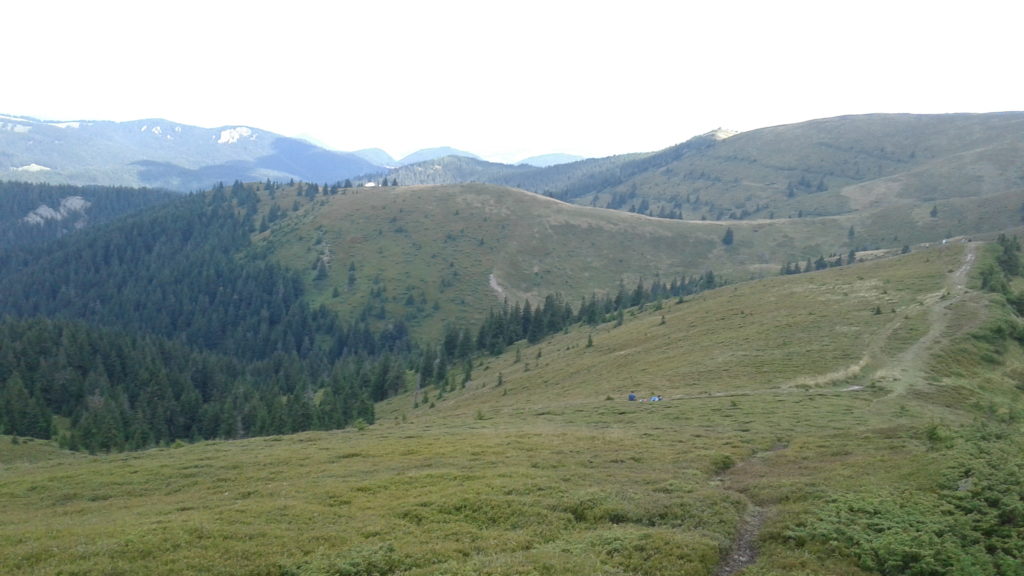
Blog inspired by some wikihow (such as https://www.wikihow.com/Find-True-North-Without-a-Compass) and this article http://blog.theclymb.com/tips/10-tips-for-wilderness-survival/
—
[RO] Vara se apropie de sfârșit. Dar asta nu înseamnă că ne vom opri din drumeții în munți. Sunt atât de multe rute bune în Munții Carpați. Hai să inhalați aer curat și bucurați-vă de priveliște. Culoarea toamnei…
Dar așteaptă, unde îmi sunt prietenii? Unde este poteca?
Sfatul n°1: Calm
Stai calm și pe loc momentan. Nu încerca să fugi la prietenii tăi. Ia un timp să te gândești și să răspunzi la câteva întrebări. Unde ești? Unde îți sunt prietenii și unde este calea? Ai vreun mijloc de comunicare?
Sfatul n°2: Observă
Dacă nu te-ai prea uitat la hartă, sau nu ți-ai plănuit plimbarea, uită-te la ce se află în jurul tău. Vreo urmă de civilizație care te-ar putea ajuta? Semne sau oameni în depărtare? Vreo urmă a cărării? Care sunt trăsăturile principale? Piscuri? Formațiuni de roci unice? Copaci speciali?
Unde ai mers înainte de a fi acolo?
Sfatul n°3: Comunicare
Un lucru bun este că în România ai deseori un semnal bun chiar și în munți. Dar trebuie să ai un telefon încărcat. Yep, nu asculta muzică Streaming music tot drumul. Vorbind despre experiență…
Deci dacă ai telefonul încărcat și semnal poți desigur să încerci să îl contactezi pe unul dintre prietenii tăi care au o idee despre drum. Poți avea niște ajutor descriind ceea ce ai observat. Dacă prietenul tău nu este accesibil, poți încerca numărul de la “cabane” / refugii din jur dacă le aveți, sau oficiul local de turism. Sau niște oameni care știu locul. În ultimă instanță poți chiar să suni la 112 și să le spui să te ajute.
Informația de bază pe care să o dai e întotdeauna: unde, ce, cine, și o idee vagă despre cum se ajunge acolo, în ordinea asta. Deci dacă bateria ta cedează măcar vor avea cea mai importantă parte de informație mai întâi.
Începe să îți găsești calea de unul singur
Desigur dacă știi drumul sau o persoană bună să îți explice calea, ar trebui să fie mai ușor să încerci pur și simplu să îți găsești ruta înapoi. Dar acesta nu este mereu cazul.
Un prim lucru de făcut ar fi să obți niște simț al orientării. Care este obiectivul tău? Dacă ai vreo idee despre hartă și îți amintești că ai venit aproximativ dinspre sud est, păi hai să ne uităm după asta.
Așadar, cum să găsești Nordul?
Bănuiesc că nu ești chiar super cercerașul și deci nu ai o busolă. Și presupunând că nu ai semnal, nu ai date mobile să downloadezi vreo aplicație (“app”) de busolă (yep, un app pentru orice bănuiesc… )
Cu toții am auzit poveștile despre mușchiul de pe copaci. Adevărul este, da, cel mai mult mușchi crește mai mult pe partea dinspre Nord pe copaci pentru că este mai puțin expusă la soare. Daaar pentru asta ai avea nevoie de, ai ghicit-o, copaci. Și o suprafață nu prea umedă unde au mușchi peste tot…

Al doilea truc știut: găsește Polaris, Steaua Polară. Așa cum este arătat mai jos, secretul este să folosești cele două stele din spatele Carului Mare și să le continui pentru a găsi ultima stea a Carului Mic. Aceea e Polaris, și asta îți arată unde e Nordul. Dacă te pui în fața ei, ai vest în stânga ta, est în dreapta, și în spatele tău este Sudul. Problema cu asta este… da, merge să o faci doar noaptea și noaptea nu prea mergi, chiar și cu niște lumini cu tine. Și nu te-aș sfătui, pentru că distanțele nu sunt chiar la fel în văzul ochiului, iar terenul ar putea avea pietre sau găuri pe care tu nu le vezi bine.
 Al treilea truc, și poate cel mai util. Găsește un băț sau folosește un pix, o furculiță sau orice care poate arunca o umbră. Marchează vârful umbrei. Așteaptă 10-15 minute. Marchează noul vârf al umbrei. Soarele s-a mutat de la Est la Vest. Umbra arată opusul (Vest spre Est). Deci dacă îți pui piciorul stâng pe primul marcaj, și piciorul drept pe al doilea marcaj, vei fi cu fața spre Nord. Singura problemă… când nu este soare.
Al treilea truc, și poate cel mai util. Găsește un băț sau folosește un pix, o furculiță sau orice care poate arunca o umbră. Marchează vârful umbrei. Așteaptă 10-15 minute. Marchează noul vârf al umbrei. Soarele s-a mutat de la Est la Vest. Umbra arată opusul (Vest spre Est). Deci dacă îți pui piciorul stâng pe primul marcaj, și piciorul drept pe al doilea marcaj, vei fi cu fața spre Nord. Singura problemă… când nu este soare.
Mai sunt multe alte trucuri și smecherii ca un truc cu marcajele de pe un ceas, numai să poți să ghicești unde e soarele. Dacă ești interesat mergi la https://www.wikihow.com/Find-True-North-Without-a-Compass)
Dacă rămâi blocat undeva
Rămâi blocat undeva în frumoșii munți Carpați din cauza vremii sau pentru că te-ai pierdut sau din orice alt motiv sunt câteva lucruri utile de făcut.
Sfatul n°3 bis : Comunicare din nou
Dacă nu poți da de cineva și va trebui să stai acolo pentru mai mult timp, încearcă să scrii “ajutor” (“help”) sau “SOS” în orice loc vizibil, fie că e din cer sau de pe urmele traseului, sau orice trăsături importante. Ai putea-o semna cu numele tău. Dar nu alarma oamenii prea mult dacă e doar o mică piedică.
Sfatul n°4: Inventar / Observație din nou
Dacă ești blocat ai avea nevoie să verifici ce resurse ai. Mai întâi, ai apă de băut? Ce rezervă de mâncare ai? Ai un adăpost? Ai foc?
Pentru apă ai avea nevoie să găsești un punct cu apă proaspătă și să o fierbi… dacă poți.
Pentru mâncare, niște cunoștințe despre plantele comestibile, fructe de pădure și ciuperci mereu ajută… dar dacă nu le știi te rog frumușel nu te otrăvi.
Pentru adăpost ai avea nevoie de niște abilități de cusut puțin ramuri împreună. Găsește o zonă potricită (nu prea umedă, prea vântoasă, cu niște copaci în jur care să te ajute să îl construiești. Sunt genul de lucruri pe care le înveți cu adevărat numai exersându-le deci nu te aștepta la miracole, doar un mic locșor temporar care să te apere de vânt și de ploaie s-ar putea să vină de folos.
Să ai o brichetă e mereu util în astfel de situații. Un mic foc te poate ajuta să fierbi apă pentru a o face băubilă și te poate încălzi pentru somn. Sunt din nou o grămadă de moduri micuțe prin care să aprinzi o scânteie pe lemn uscat. Niște ochelari sau un bloc de gheață folosite pentru a concentra soarele de exemplu. Dar majoritatea dintre ele necesită niște frânghii ale unui cuțit.. Acele lucruri pe care, din nou, s-ar putea să nu le fi luat.
Concluzii
În natură, un cuțit sau un cuțit multifuncțional te pot duce departe. Niște apă și o brichetă pot de asemenea să fie utile în multe cazuri, nu numai în cele extreme. Pantofi buni și un rucsac bun te pot ține din a avea dureri întâmplătoare. Să știi un pic zona e de asemenea un plus.
Într-un cuvânt, te rog, pregătește-ți călătoria 😉
Oh și te rog, acestea sunt sfaturi utile dar în realitate, dacă ești puțin pregătit, nu va trebui să te îngrijorezi prea mult.
Deci bucură-te de niște priveliști minunate !
Blog inspirat de niște wikihow-uri (precum https://www.wikihow.com/Find-True-North-Without-a-Compass) și de acest articol http://blog.theclymb.com/tips/10-tips-for-wilderness-survival/
Thibaut este în România pentru o perioadă de 4 luni, din iunie 2018 până în septembrie 2018, în cadrul proiectului Behind Borders [2017-2-BE05-KA105-002181] proiect cofinanțat de Uniunea Europeană prin Programul Erasmus+ și implementat în România de către Curba de Cultură.
Portret de voluntar – Thibaut (Belgia)

“The journey of a thousand miles begins with a single step.”
Bună ziua. My name is Thibaut Gillet and I’m from Belgium. Over there I lived in a small and quiet village in a flat agricultural area. I studied geography and got my master. Then I look for a job and did some voluntary work locally on a second hand store. But I felt something wasn’t going right.
I felt like I couldn’t find the right place for me either because the job would be numbing and/or pointless or because I felt frustrated by the negative answers for my applications to the jobs for which I’d have been a good fit.
I needed to see and live something else… and I guess everyone who goes to EVS is looking for the same thing. I heard from EVS through a really nice organization in Belgium called “compagnons battisseurs” (not linked with the franc-macon, I asked :p). So I decided why not apply to some projects too besides the job applications.
I wanted to find an organization and a project that works in a rural area and that integrates the population around them and that want to promote some values for a better well-being for everybody. So far I really feel like I’ve found the right ones.
It’s still a challenge for me; I’ve a strong side of me that just need some alone and quiet time. And I don’t consider myself as a creative and extravert one. But I want to learn how to animate a group, how to get them invested, and how make them understand or grow knowledge through some fun time.
I like tennis, windsurf, and hiking. I also like maps, strategic games, video games, movies, poetry, philosophy and almost everything and everyone that can help you see things from different angles and points of view.
Bună ziua. Numele meu este Thibaut Gillet și vin din Belgia. Acolo locuiesc într-un sătuc mic și liniștit într-o zonă agricolă. Am studiat geografia și am terminat un master. Apoi mi-am căutat slujbe și am făcut puțin voluntariat la un magazin second hand local. Dar parcă ceva nu mergea bine.
Mi se părea ă nu găsesc locul potrivit și asta ori pentru locul de muncă va fi plictisitor sau fără rost ori pentru că eram frustrat din cauza refuzurilor din partea angajatorilor pentru joburile la care mă simțeam potrivit.
Așa că voiam să văd și să trăiesc altceva… și cred că totți cei care merg în SEV caută același lucru. Am auzit despre SEV prin intermediul unei organizații din Belgia numită “compagnons battisseurs” (fără vreo legătura cu franc-masonii, am întrebat :P). Și am aplicat și la astfel de proiecte pe lângă locurile de muncă.
Am vrut o organizație și un proiect într-o zonă rurală care să integreze populația din jur și care să promoveze valorile unui trai propsper pentru toți. Până acum mi se pare că am găsit-o pe cea potrivită.
Este însă în continuare o provocare pentru mine. O mare parte din mine vrea singurătate și timp pentru sine. Și nu mă consider creativ ori extrovert. Dar vreau să învăț cum să animez un grup, cum să îi implic și cum să le transfer cunoștințe într-un mod distractiv.
Imi plac tenisul, winsurfingul și drumețiile. De asemenea îmi plac hărțile, jocurile de strategie, jocurile video, filmele, poezia, filosofia și aproape tot sau toți cei care mă pot ajuta să văd lucrurile din unghiuri și perspective diferite.
Thibaut este în România pentru o perioadă de șase luni, din iunie până în decembrie 2018, în cadrul proiectului Behind Borders [2017-2-BE05-KA105-002181] proiect co-finanțat de Uniunea Europeană prin Programul Erasmus+ și implementat în România de către Curba de Cultură.